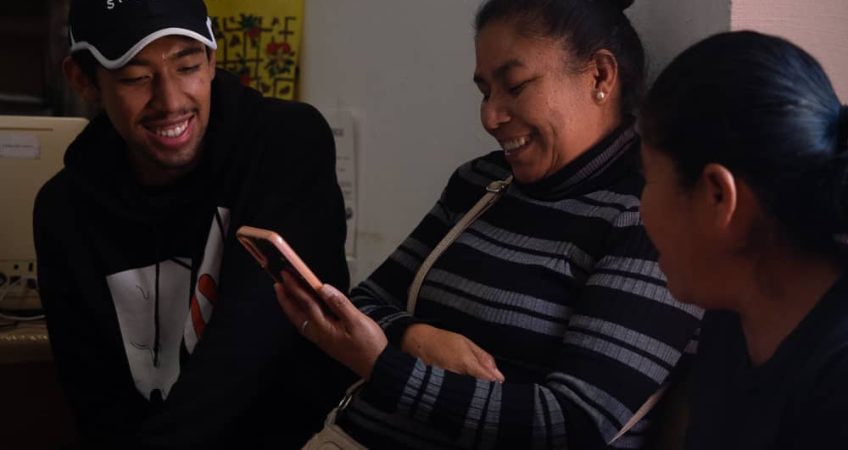
Accessible Technology Advancing Sustainable Development
Recognizing the potential of accessible technology to foster sustainable development, PSYDEH explores tools like Google Lens to promote new opportunities and address local inequalities with rural and Indigenous women and their communities.
Accessible technology as a human right
Technology is pivotal to empowering communities, globally and across Mexico, by fostering sustainable development through education, economic opportunities, and civic engagement, thereby also protecting human rights. Despite the recognition of internet access as a fundamental human right by the UN, nearly 3 billion people worldwide lack internet connectivity (UN, 2021). In Mexico, approximately 20 million people lack broadband coverage and 98% of internet users rely on smartphones (US DOC). This glaring inequality emphasizes an urgent need for communities throughout Mexico to keep pace with technological advancements and fundamental human rights.
UNESCO has identified that illiteracy most often impacts older adults, individuals with disabilities, agricultural workers, Indigenous people, and women. Among the 773 million people worldwide who cannot read or write, 61% are women. (UNESCO, 2018). These disparities are evident in rural, underdeveloped areas, such as eastern Hidalgo in central Mexico, where rural women and their communities also face unequal access to technology.
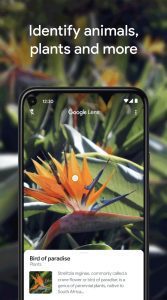 Combining digital inclusion and economic solidarity
Combining digital inclusion and economic solidarity
In early 2022, PSYDEH launched Tech For All (“Tec Para Todos”) alongside the Sierra Madre Network (“Red Sierra Madre”) program to foster local community-driven development and address the social, economic, and gender equality gaps further exacerbated by the COVID-19 pandemic. Through the establishment of Tech For All, PSYDEH initiated a three-phase process over three years focused on 1) local IT infrastructure, 2) digital literacy training, and 3) tech tools for social innovation. Over the course of 2022, and with vital support from Viasat Inc., Clear Blue Technologies, and the Honnold Foundation, PSYDEH established six remote digital resource centers with satellite internet, solar energy solutions, and new information and communications technology.
Bridging worlds with Google Lens
As outlined in PSYDEH’s Tech For All program, proficiency in technology is becoming as vital as reading and writing skills. In rural contexts with low education levels, our team has discovered that Google Lens, a powerful image recognition tool launched in 2017, holds great potential for bridging both a literacy and digital literacy gap.
With its ability to identify objects, translate text, solve math problems, and provide relevant information based solely on photos, Google Lens offers revolutionary accessibility features, eliminating the need for users to read or write. Thanks to an initial exploration into the tool with PSYDEH staff and Viasat volunteers in November 2022, it was determined that Google Lens should be incorporated into the 2023 programming curriculum with PSYDEH’s women partners.
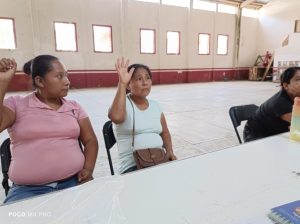 In April 2023, I helped to lead PSYDEH’s first Google Lens workshops designed for four cooperatives based in the remote mountainous region of the Sierra Otomí-Tepehua-Nahua of Hidalgo. The workshop is based loosely on a curriculum and learnings from Viasat partners (see this promo video for more on our collaboration).
In April 2023, I helped to lead PSYDEH’s first Google Lens workshops designed for four cooperatives based in the remote mountainous region of the Sierra Otomí-Tepehua-Nahua of Hidalgo. The workshop is based loosely on a curriculum and learnings from Viasat partners (see this promo video for more on our collaboration).
On the morning of Tuesday, April 19, our first Google Lens workshop was held in the municipality of Huehuetla, deep in the Sierra Madre mountains, nearly six hours northeast of Mexico City, with the women-led cooperative La Fuerza Otomi-Tepehua. Many of the cooperative members shared that they had never used Google before, and certainly had never heard of Google Lens. There were several who gave a thumbs down in terms of their digital literacy during our initial diagnostic. When asked their thoughts on whether technology and accessibility were important they expressed similar views; everyone deserves equality, but not everyone gets equal treatment.
Each generation had different interests and viewpoints when it came to technology. The younger crowd, under 40 years old, wanted to know how Google Lens could help their cooperatives sell their handmade textiles and other artisan products. Elders of the group were more interested in how they could read or send a text message. After a few hours of practice translating texts, identifying embroidery patterns, and having Google Lens read words captured from a piece of paper, the women seemed excited about this new tool.
The evaluation towards the end of the workshop was overwhelmingly positive. A majority of the women reported that they felt relatively comfortable using Google Lens and were able to expand on how they could use this tool in their everyday lives. “The most important part,” shared Alejandra Ríos Perez, PSYDEH’s Field Program Coordinator, “is that they are interested!”
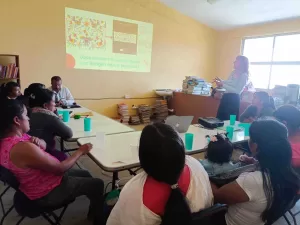 The next day, the second workshop was held in Santa Catarina, a remote town in the municipality of Acaxochitlán. Santa Catarina is only reachable by an unpaved road. Here, the team faced the most barriers with our Google Lens workshop. With no wifi, the cooperative members, a majority who speak Nahua as their first language, needed to purchase extra data in order to fully take part in the workshop. Despite these barriers, participants seemed to be attentive and curious about these new accessibility tools. Many of the younger cooperatives members took a strong interest in Google Lens, seeing it as a tool to help better price the cooperative’s products, help with their children’s homework, and “show off to my husband” joked, Reina Cruz Rojas, president of the Sihuame Tekikame cooperative. Many PSYDEH team members commented how tricky workshops introducing new technology are to this cooperative. But if it was possible in Santa Catarina, they said, the chances of tech tools like Google Lens taking off in other remote parts of Hidalgo and, potentially, across Mexico were high.
The next day, the second workshop was held in Santa Catarina, a remote town in the municipality of Acaxochitlán. Santa Catarina is only reachable by an unpaved road. Here, the team faced the most barriers with our Google Lens workshop. With no wifi, the cooperative members, a majority who speak Nahua as their first language, needed to purchase extra data in order to fully take part in the workshop. Despite these barriers, participants seemed to be attentive and curious about these new accessibility tools. Many of the younger cooperatives members took a strong interest in Google Lens, seeing it as a tool to help better price the cooperative’s products, help with their children’s homework, and “show off to my husband” joked, Reina Cruz Rojas, president of the Sihuame Tekikame cooperative. Many PSYDEH team members commented how tricky workshops introducing new technology are to this cooperative. But if it was possible in Santa Catarina, they said, the chances of tech tools like Google Lens taking off in other remote parts of Hidalgo and, potentially, across Mexico were high.
If Santa Catarina was the most remote location, Tenango de Doria was the most accessible. The cooperative Tierra de Bordadoras led by PSYDEH Field Corps Leader Jazmín (Jaz) Manrique Vigueras, had the best access to the internet in the region, plus several cooperative members equipped with the latest smartphone models. After practicing with Google Lens features including the translation and reading aloud tool, cooperative members were excited by the thought of sending their kids text messages and not having to memorize their grocery lists at the market. There were a handful of older members who had limited Spanish and needed Otomí translations from Jaz, but even so, they were able to understand the Google Lens voiceover in Spanish.
The final Google Lens workshop of the week took place in San Bartolo Tutotepec, a two hour drive from Tenango, and one of the most marginalized municipalities in Mexico. We were met with curiosity and nerves. The leader of the cooperative Yu Danxu Mpefi Di Toi was nervous at first to share the little experience she had with Google, but by the end of the workshop she was taking photos of library books and translating them into English with ease. Roughly 80% of women who rated their technology abilities with a thumbs down at the beginning of the workshop rated themselves with a thumbs up or so-so by the end. We finished by asking them to use Google Lens to solve daily challenges like sending messages to family members, reading doctor notes, and translating signs as an assignment before their next workshop to be held two weeks later.
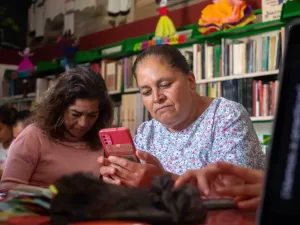
The realities of sustainable development – it’s not all roses
When we assisted cooperative members, especially the younger participants attempting to assist elder participants, we noted that some women lacked enthusiasm. A handful of older members felt overwhelmed by the new technology, questioning its usefulness without access to wifi or data. They have a point. Workshops on digital literacy, especially in remote areas and among older Indigenous generations, can highlight the potential these tools hold for both present and future community members without demanding everyone adopt the same tools. As beautifully articulated by the International Institute for Sustainable Development, sustainable development can “meet the needs of the present without compromising the ability of future generations to meet their own needs.” Guided by this principle, PSYDEH’s programs strive to empower women-led cooperatives with technology compatible with local, cultural, and economic conditions and then allow women to make informed and autonomous decisions around personal and collective adoption of these tools.
Similar hesitancy toward new technology emerged from community members outside the cooperative workshops. Conversations with an older man in Tenango de Doria shed light on concerns about Google Lens and external influences on local Indigenous culture, including my own presence. This discussion prompted dynamic conversations within PSYDEH: What influence do our workshops have on the communities we serve? Far too often, top-down development models neglect the opinions of those they aim to “serve.” In the complexities that must be addressed during the design process of sustainable development programs (education, income, gender, abilities, etc.), the answer is an unbelievably simple one: ask the community what they need. Never make assumptions. Check-in at every stage of the process. Understand what is and is not relevant. See how tools are being integrated. Listen and process feedback.
By prioritizing community needs, we move away from imposition and embrace open-mindedness and curiosity. By engaging in the design process, communities actively shape programming, promote innovation, and foster human rights.
Aligned with PSYDEH’s process-oriented, community-driven development model, our Google Lens workshop series was designed to address gaps in both literacy and digital literacy as shared by community members in the municipalities where we work. In turn, these workshops empowered women through new information, tools, and exchanges so that they could actively assess the value and relevance of these technological tools for future use.
Closing gaps and exploring the future
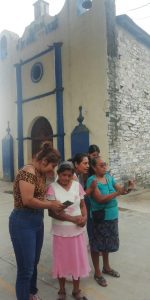 The “right to connection” is more than having internet access; it includes the ability to connect with new communities and resources, empowering women to lead their own education and build independent networks. Marginalized communities can also represent themselves and tell their own stories using technology. Communities can gather their own data and implement responses to local social, economic, and gender inequalities. While it is understood that technology can exacerbate social issues, it can also strengthen solutions. For example, in the case of gender-based violence, women with access to technology are likely to have more tools and resources to help break patterns of violence.
The “right to connection” is more than having internet access; it includes the ability to connect with new communities and resources, empowering women to lead their own education and build independent networks. Marginalized communities can also represent themselves and tell their own stories using technology. Communities can gather their own data and implement responses to local social, economic, and gender inequalities. While it is understood that technology can exacerbate social issues, it can also strengthen solutions. For example, in the case of gender-based violence, women with access to technology are likely to have more tools and resources to help break patterns of violence.
Following the workshops, cooperative members have already reported using Google Lens to read doctor’s prescriptions aloud when visiting the pharmacy and comparing pricing with other artisan cooperatives across Mexico. Although barriers persist in these remote communities, the areas that PSYDEH serve are gradually integrating into new national and global digital landscapes thanks in part to accessible technology like Google Lens. With new tools, a dedicated team, and a growing network of women partners, PSYDEH’s work addressing severe gaps in social, economic, and gender inequality in rural Mexico looks much more promising than even a few years ago. In a relatively short time, PSYDEH’s Sierra Madre network of cooperatives is both learning and using accessible technology to increasingly champion their own needs and rights.
Author: Alex Lane
USA Development Associate, PSYDEH
